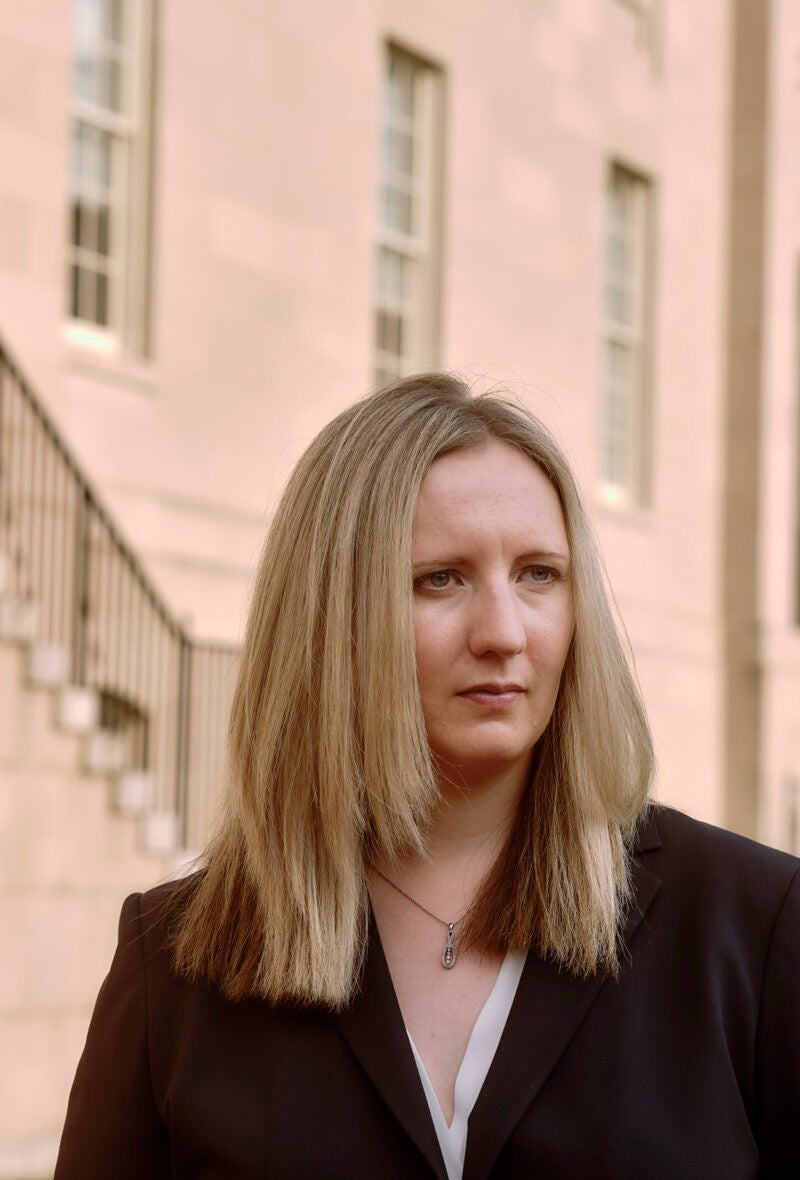The stuffed animal sits on a shelf behind Vanessa Strobbe’s desk, a reminder of a past case.
The toy once served as emotional support for a young girl who had been sexually abused by a member of the military. Strobbe, who was then serving as a prosecutor in the United States Army, says she spent a lot of time getting to know the child, earning her trust, and preparing her to testify in a trial against her abuser. When the day finally came, Strobbe walked the girl to the stand, but just before she reached the witness box, she turned and handed Strobbe the plush.
“I asked her, ‘Don’t you want this with you?’” says Strobbe. “And she said, ‘I don’t need it anymore. I have you.’”
When she was a student at Harvard Law School, Strobbe’s interests ranged from national security to criminal justice, always with public service in mind. Her Semester in Washington placement was with a prosecutor for the U.S. Army. “He was an incredible mentor, says Strobbe, “who treated me not like an intern, but like a second chair.” The work, which focused on felony prosecutions, confirmed her desire to join the U.S. Army Judge Advocate General’s Corps after graduation.
After completing the bar exam — and the Basic Officer Leader Course — Strobbe was first stationed in North Carolina, and then, in 2013, deployed to Afghanistan, where she served as the sole lawyer assigned to several units. There, she led investigations, helped with disciplinary actions, and trained the soldiers on the rules of engagement. And she didn’t just sit back and wait for questions in the safety of Kabul’s Green Zone. “I also accompanied soldiers on missions to ensure that they were complying with the laws of war,” she says.
Strobbe adds that, at the time, the feeling was that the U.S. was drawing down in Afghanistan, and her units were charged with tearing down bases or transferring their control to the Afghan Army. Her work took her across the country, from cities to remote regions, where she saw the impact of war on the country and its people.
“The most meaningful thing for me is to be at the helm of ensuring justice for someone who’s been wronged, but at the same time, working diligently to ensure that that pursuit of justice is fair for the accused.”
Nine months later, Strobbe returned to the U.S., got into the courtroom, “and I haven’t left since,” she says. As an Army JAG officer, Strobbe held jobs and duty stations that changed often, and she quickly gained experience as a prosecutor and senior prosecutor, and then shifted to work as defense counsel.
She says she feels privileged to have been able to serve victims, to help them through the worst thing that has ever happened to them. But she adds that it has also been valuable “to represent soldiers accused of heinous things, who are facing life in prison or the death penalty. I have gotten to know the human on that side of the aisle as well.” With the help of her co-counsel — and three Harvard Law interns — Strobbe even saved one defendant from the death penalty.
These experiences have influenced her profoundly, she says. “The most meaningful thing for me is to be at the helm of ensuring justice for someone who’s been wronged, but at the same time, working diligently to ensure that that pursuit of justice is fair for the accused.”
Strobbe acknowledges that the work could be difficult. In one case, she prosecuted a soldier who had murdered his Panamanian girlfriend and immediately returned to the U.S. after her body was discovered. Many in Panama worried that he would not have to face justice. “But we devoted many resources and a lot of diligence to prosecuting him,” Strobbe says. “And Panamanian officials, friends, and family members of the victim were flown in to see our justice system and to watch the jury of military officers convict this person for the terrible thing he did.”
Today, as Strobbe transitions out of the Army and into the U.S. Attorney’s Office for the Eastern District of Virginia, she says it is not victory that she seeks — it’s justice.
“There is no winning in a prosecution,” she says. “That’s someone’s father, that’s someone’s son, who’s going to jail. I want to be sure I am doing right by someone who has gone through a terrible thing, while at the same time ensuring that the defendant has a fair process.”
It’s why that little girl’s stuffed toy is displayed in such a prominent place in Strobbe’s office. “It’s a daily reminder of the people we do this for. These are real people, and what you do for them can make a difference in their life.”
Working for the People
Fifteen years ago, Harvard Law School launched its Semester in Washington Clinic, an externship program focused on training government lawyers. Meet three other former participants who are dedicating their careers to government service
